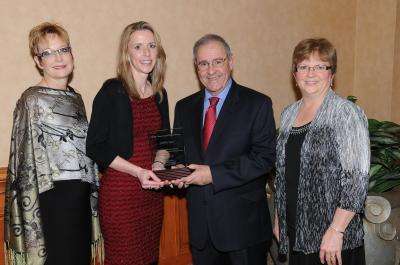MU program helps health care workers move past tragedy

When a patient dies unexpectedly, whether suddenly or after a long illness, the loss can hit loved ones hard. In some of these cases, health care workers can be affected deeply due to the emotional bonding that can occur between patients and their caregivers. Now, studies have shown that a new program that provides support and training at the University of Missouri Health Care System is helping health care workers get back on their feet and heal both mentally and physically.
"Our staff is here to help patients, but when the care doesn't lead to a positive outcome, it can take a toll on our staff's psyche," said Susan Scott, a registered nurse, patient safety coordinator and director of the forYOU peer support program at MU Health Care and doctoral student in the Sinclair School of Nursing. "The term "second victim" is used to describe health care workers who suffer physically or emotionally following a negative outcome in a medical setting. The 'first victim' is the patient and his or her family, but the health care worker becomes the 'second victim.' "
Situations that can result in an emotional burden for a health care provider include an unanticipated decline in a patient's condition, caring for young trauma victims, the first death experienced as a health care worker, caring for young victims of violence or neglect, the death of a patient who was starting to recover, violence in the workplace, dealing with elder abuse cases or even a colleague's death.
"As a caring being, individuals enter into health care to help people; after a while you may become resilient to many situations, but some cases can drill through that armor that builds up over years and can leave an emotional scar," Scott said.
To support health care providers through these emotional situations, in 2006 Scott and her colleagues established a team that supports caregivers after any adverse event. In the last several years, Scott and her team have conducted numerous studies to determine what is needed to most effectively provide the necessary support for second victims to help them recover from their respective clinical event.
"Following an event, clinicians are willing to review the outcome of the case and determine if any actions could be taken to avoid a negative outcome in the future, but then many of them will immediately start questioning whether they wanted to continue their career in health care," Scott said.
One such case involved a nurse, "Elaine," who was attacked by a female patient waking up following a surgical procedure.
"I was in the recovery room with the adult patient, and as I was repositioning a bed pan, the patient took one of the monitoring cords that was attached to her and wrapped the cord around my neck and started to strangle me," Elaine said. "It only lasted a few seconds, but it seemed like forever."
Elaine stayed home the following day, but was back at work within 48 hours. When she arrived, her co-workers and the peer support team greeted her.
"Eventually, I was fine, but after something like that happens, you question every move you make; it shakes the core of your foundation as a health care worker," Elaine said.
According to Laura Hirschinger, R.N., M.S.N., co-investigator and forYOU tam leader, Elaine's response to the event is very common. The forYOU research team identified eight actions in three tiers of clinician support with action items that should be addressed following an event:
- Tier I (basic, immediate emotional first aid offered by supervisors/colleagues in the same department as the second victim)
- Address potential second victims to ensure that they are "OK" immediately following a critical clinical event.
- Provide basic awareness training to unit leaders and colleagues to educate them on key actions to take following an event.
- Tier II (guidance and nurturing of second victims by colleagues specifically trained on the second victim experience)
- Embed specially trained peer supporters within clinically high-risk departments
- When necessary, refer second victims to internal resources, such as patient safety experts, for support.
- Provide long-term assistance for legal action if necessary.
- Offer group debriefings when an entire team is affected.
- Tier III (ensure prompt availability and access to professional counseling and guidance)
- Provide a fast-track referrals to individuals specifically trained to handle crisis intervention, if necessary.
- Provide access to additional hospital resources such as chaplains, social workers and clinical psychologists if necessary.














